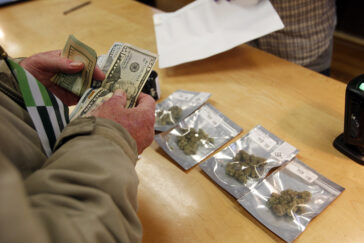March 27, 2020
Best of the States
Fast, definitive work on US price gouging complaints amid coronavirus crisis
When reporters Justin Pritchard and Reese Dunklin were asked to look into price gouging and profiteering off the coronavirus crisis, they sought to go deeper by employing a key part of their investigative reporting toolkit: a systematic reporting strategy.
The pair quickly executed a plan to question attorneys general in all 50 states, resulting in the most comprehensive look yet at the problem across the nation. In just two days of reporting, Pritchard and Dunklin uncovered more than 5,000 reports of everything from price gouging on toilet paper and masks, to scams offering tests and even cures for the illness.
Their brightly written story won strong play on a busy day of coronavirus news, hitting the wire hours before Attorney General William Barr announced new actions against such crimes.
For fast, aggressive work that tapped into a topic on the public’s mind, AP recognizes Pritchard and Dunklin with this week’s Best of the States award.













